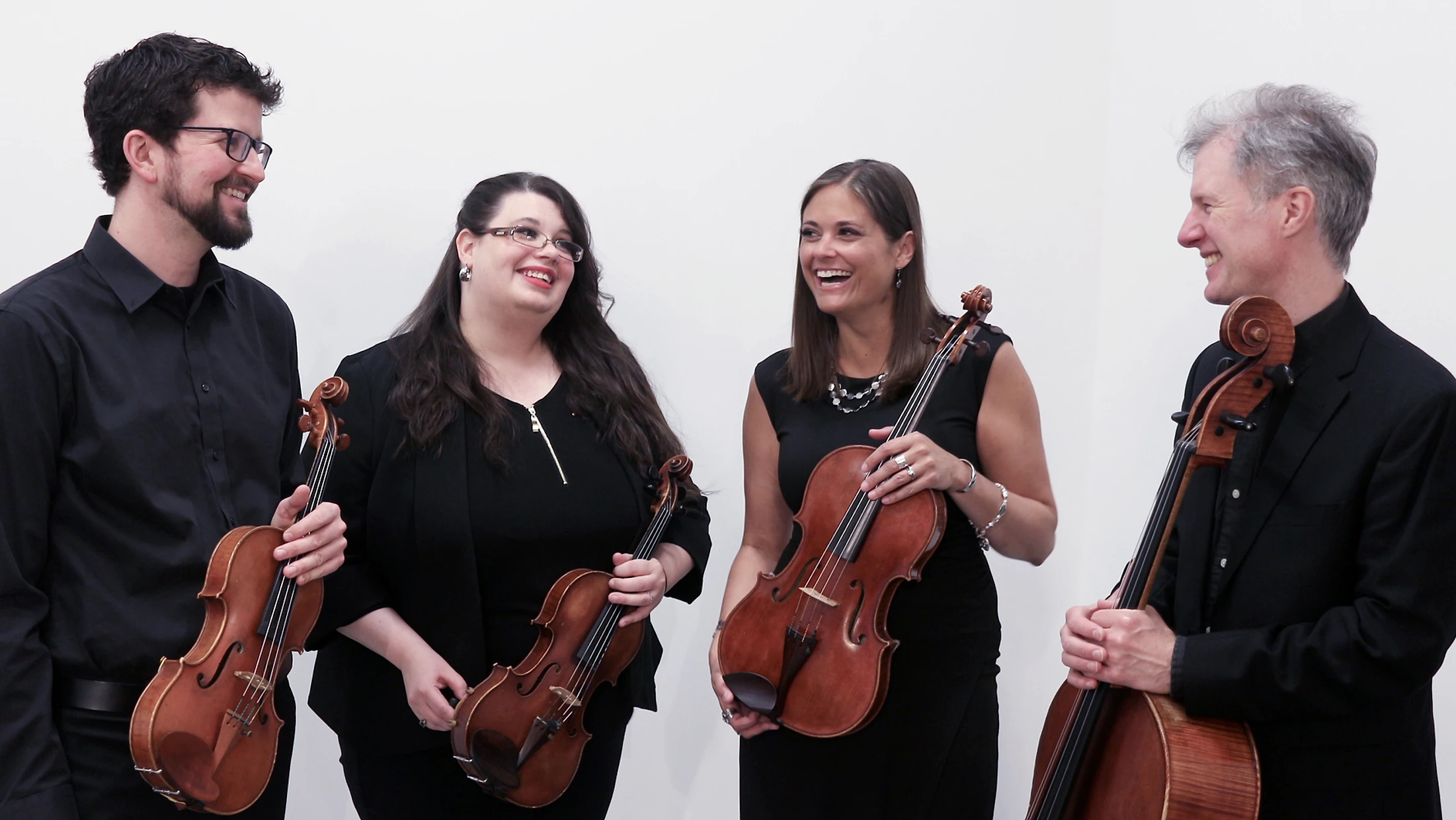Levine Presents: Living Composers
Saturday,
January 27, 2024
7 PM
DC Campus: NW + Online
The 9th Street Quartet
Matt Richardson, violin
Jennifer Wade, violin
Liz O’Hara, viola
Andrew Rammon, cello
The string quartet has been a favorite of composers and music enthusiasts for centuries. The intimate yet complex sound of two violins, a viola, and a cello working in harmony creates a distinctive musical experience. Long considered a prestigious form, the string quartet represents one of the true tests of the composer’s art, and it is the living genre we’ll explore alongside the 9th Street Quartet in Levine Presents: Living Composers on January 27.
The 9th Street Quartet, which includes Levine’s very own Andrew Rammon as cellist, is the Quartet-in-Residence for 9th Street Chamber Music – a chamber music performance and education program based in Northern Virginia. Since their formation in 2017, they have dedicated themselves to making chamber music accessible to all through performance series in intimate venues and the 9th Street Chamber Music String Quartet Intensive education programs.

Their programs blend the old and the new: new masterpieces paired with old standards, traditional forms in intimate settings, experienced listeners with new concertgoers, and experienced musicians with students.
The Quartet noted on the Living Composer program: “For this program, we selected pieces by living composers that we love and think are both profound and accessible to all. We chose living composers to show that the art form of the string quartet is alive and exciting and think the variety will include something for everyone.”
The evening will begin with Strum by Jessie Montgomery. The piece, composed in 2006 and revised in 2012, draws on American folk idioms and the spirit of dance and movement with a narrative that begins with fleeting nostalgia and transforms into ecstatic celebration. Montgomery notes, “Within Strum, I utilized texture motives, layers of rhythmic or harmonic ostinati that string together to form a bed of sound for melodies to weave in and out. The strumming pizzicato serves as a texture motive and the primary driving rhythmic underpinning of the piece.” Montgomery’s music interweaves classical music with elements of vernacular music, improvisation, poetry, and social consciousness, making her an acute interpreter of 21st-century American sound and experience.
The Quartet will then explore Summa by Estonian composer Arvo Pärt. Known as a sacred minimalist, Pärt wrote Summa in 1978 as an acapella vocal work for four singers with text from the Credo of the Mass. Twelve years later, it was arranged by the composer for string quartet. His version for string quartet strips the primary material to an even rawer form, but the unspoken words of the Credo underlie the music’s structure. Summa bears the distinctive qualities of Pärt’s music, masking its great collective complexity with simplicity in each part.
Next on the program is Appalachian Polaroids by Steve Snowden. In his program notes, Snowden recalls that the work “was initially inspired by the controversial portrait photography of Shelby Lee Adams (b. 1950). Though sometimes criticized for perpetuating the hillbilly stereotype of rural Appalachia, his photographs often illuminate the quiet resilience of these remote mountain communities.” A native of the Ozark Mountains countryside, Snowden, in Appalachian Polaroids, constructs his musical portrait of the unique mix of hardship and joy of living an isolated rural life.
The piece begins with a field recording of the popular folk song Black is the Color by Sheila Kay Adams in Asheville, North Carolina, in 1976. Playing with the wood of their bows to create an effect similar to the tape hiss present in the equipment used to record Sheila’s stunning voice, the quartet enters as an integrated component of the recording. Their sound gradually grows while becoming more splendid, reaching a state reminiscent of Appalachian fiddle playing.
Next, a local piece, Plan & Elevation by Caroline Shaw, was commissioned for Dumbarton Oaks in Washington, DC. It was premiered by the Dover Quartet in the music room of Dumbarton Oaks on November 1, 2015, to commemorate the 75th anniversary of Dumbarton Oaks. Plan & Elevation examines different parts of the estate’s beautiful grounds. Each movement is based on a simple bass line supporting a different musical concept or character. Caroline Shaw, at 33, was the youngest composer to win the Pulitzer Prize for music in 2013. She is a musician who moves among roles, genres, and mediums, trying to imagine a world of sound that has never been heard before but has always existed.
The program will conclude with Philip Glass’s stunning String Quartet No. 5. Composed in 1991, this is the most substantial of his five quartets and the most traditional, using formal structures and expressive contrasts that go far beyond minimalism. Glass sets out from the start to create textures and moods seldom found in his works, and to combine and synthesize his familiar musical trademarks in unexpected ways. While maintaining Glass’s unmistakable personal style, this quartet delivers both driving energy and an unforgettable, dirge-like tenderness.
Preview the Music
Enjoy this Spotify list curated by the 9th Street Quartet of the pieces on the program.
Join us in person or online on Saturday, January 27, 2024 at 7 PM.
Tickets are $20 in advance, $25 at the door, and free for Levine students; online tickets are free.
Reserve tickets.
